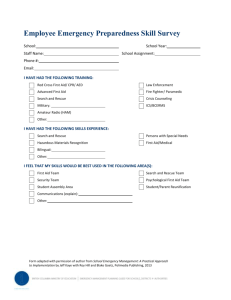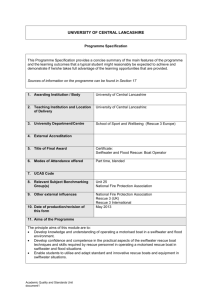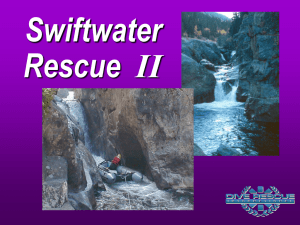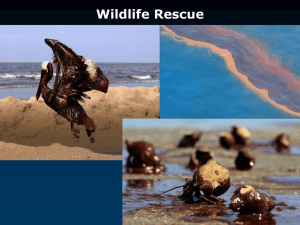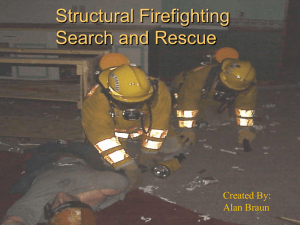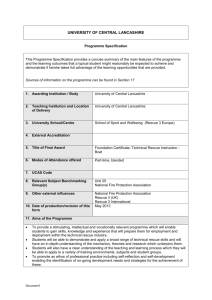cert_swiftwater_rescue_technician - University of Central Lancashire
advertisement
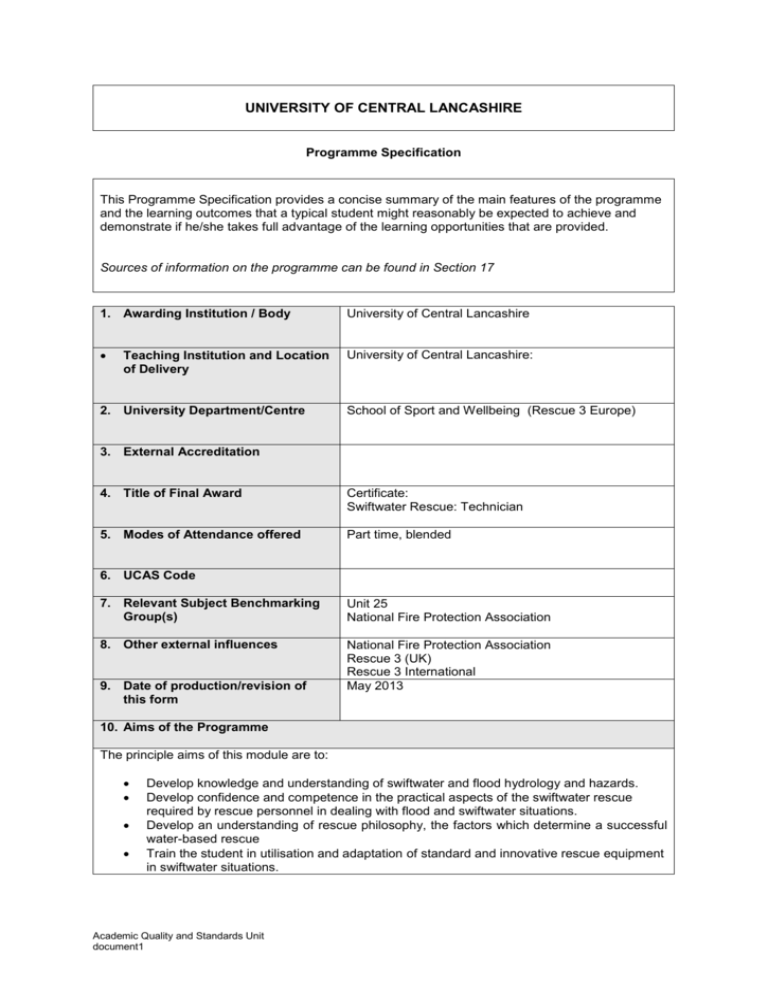
UNIVERSITY OF CENTRAL LANCASHIRE Programme Specification This Programme Specification provides a concise summary of the main features of the programme and the learning outcomes that a typical student might reasonably be expected to achieve and demonstrate if he/she takes full advantage of the learning opportunities that are provided. Sources of information on the programme can be found in Section 17 1. Awarding Institution / Body University of Central Lancashire University of Central Lancashire: Teaching Institution and Location of Delivery 2. University Department/Centre School of Sport and Wellbeing (Rescue 3 Europe) 3. External Accreditation 4. Title of Final Award Certificate: Swiftwater Rescue: Technician 5. Modes of Attendance offered Part time, blended 6. UCAS Code 7. Relevant Subject Benchmarking Group(s) Unit 25 National Fire Protection Association 8. Other external influences National Fire Protection Association Rescue 3 (UK) Rescue 3 International May 2013 9. Date of production/revision of this form 10. Aims of the Programme The principle aims of this module are to: Develop knowledge and understanding of swiftwater and flood hydrology and hazards. Develop confidence and competence in the practical aspects of the swiftwater rescue required by rescue personnel in dealing with flood and swiftwater situations. Develop an understanding of rescue philosophy, the factors which determine a successful water-based rescue Train the student in utilisation and adaptation of standard and innovative rescue equipment in swiftwater situations. Academic Quality and Standards Unit document1 11. Learning Outcomes, Teaching, Learning and Assessment Methods A. Knowledge and Understanding 1 Demonstrate sound working knowledge of swiftwater and flood hydrology and hazards. 2 Demonstrate knowledge of incident size-up and incident management techniques. 3 Demonstrate working knowledge and ability to use all equipment applicable to Swiftwater rescue including personal protective equipment and technical equipment. 4 Demonstrate understanding of and ability to apply a range of techniques to rescue victims from swiftwater and floods. 5 Demonstrate competency in operating in Swiftwater and floods and application of theoretical knowledge into a practical setting. Teaching and Learning Methods Lectures, workshops, seminars, case studies, self-directed learning. Significant aspects of online learning. Assessment methods Multiple choice examinations, presentations, practical assessments, peer assessments, case studies, written tests. B. Subject-specific skills 1 Demonstrate sound working knowledge of swiftwater and flood hydrology and hazards. 2 Demonstrate knowledge of incident size-up and incident management techniques. 3 Demonstrate working knowledge and ability to use all equipment applicable to Swiftwater rescue including personal protective equipment and technical equipment. 4 Demonstrate understanding of and ability to apply a range of techniques to rescue victims from swiftwater and floods. 5 Demonstrate competency in operating in swiftwater and floods and application of theoretical knowledge into a practical setting Teaching and Learning Methods Lectures, workshops, seminars, case studies, self-directed learning. Significant aspects of online learning. Assessment methods Multiple choice examinations, presentations, practical assessments, peer assessments, case studies, written tests. C. Thinking Skills 1. Demonstrate sound working knowledge of swiftwater and flood hydrology and hazards. 2 Demonstrate knowledge of incident size-up and incident management techniques. 3 Demonstrate working knowledge and ability to use all equipment applicable to 2. Swiftwater rescue including personal protective equipment and technical equipment. 4 Demonstrate understanding of and ability to apply a range of techniques to rescue victims from swiftwater and floods. 5 Demonstrate competency in operating in swiftwater and floods and application of theoretical knowledge into a practical setting Teaching and Learning Methods Lectures, workshops, seminars, case studies, self-directed learning. Significant aspects of online learning. Assessment methods Multiple choice examinations, presentations, practical assessments, peer assessments, case studies, written tests. D. Other skills relevant to employability and personal development 1 Demonstrate sound working knowledge of swiftwater and flood hydrology and hazards. 2 Demonstrate knowledge of incident size-up and incident management techniques. 3 Demonstrate working knowledge and ability to use all equipment applicable to Swiftwater rescue including personal protective equipment and technical equipment. 4 Demonstrate understanding of and ability to apply a range of techniques to rescue victims from swiftwater and floods. 5 Demonstrate competency in operating in swiftwater and floods and application of theoretical knowledge into a practical setting Academic Quality and Standards Unit document1 2 Teaching and Learning Methods Lectures, workshops, seminars, case studies, self-directed learning. Significant aspects of online learning. Assessment methods Multiple choice examinations, presentations, practical assessments, peer assessments, case studies, written tests. 13. Programme Structures* Level Level 4 Module Code TL1500 Module Title Swiftwater Rescue: Technician 14. Awards and Credits* Credit rating 20 Certificate in (20 credits): Swiftwater Rescue: Technician 15. Personal Development Planning The programme incorporates significant aspects that relate to personal development planning. A strong focus is placed on the transfer and application of skills and knowledge into the workplace. Students are encouraged to develop their vocational skills through their work in the area and engage in a professional practice module. A personal tutoring support system is in place throughout the programme which supports students’ engagement and personal development. The programme benefits from dual accreditation with independent awards being presented by the University and Rescue 3 International / Rescue 3 (UK). Rescue 3 International / Rescue 3 (UK) certifies each associated module and students will receive certification from Rescue 3 International / Rescue 3 (UK) for each module they successfully complete. 16. Admissions criteria Programme Specifications include minimum entry requirements, including academic qualifications, together with appropriate experience and skills required for entry to study. These criteria may be expressed as a range rather than a specific grade. Amendments to entry requirements may have been made after these documents were published and you should consult the University’s website for the most up to date information. Students will be informed of their personal minimum entry criteria in their offer letter. Students must be engaged with the area of Swiftwater Rescue, as demonstrated through employer sponsorship, work experience within the industry (paid or voluntary), prior experiential learning/training and/or educational attainment. These criteria are not pre-requisites for admission but will be considered along with previous life experience and a demonstrated enthusiasm for a career within/related to the Swiftwater Rescue Industry. Access to a computer with a broadband connection and basic IT skills (ability to navigate web-pages & produce basic Word documents), are essential to engage with the blended learning aspects. Employer’s sponsorship of the student will contribute significantly to this demonstration of engagement. Successful applicants must have the ability to swim 25 metres. 17. Key sources of information about the programme University Web Site: www.uclan.ac.uk/sport Factsheet University Prospectus UCLan Sport open days and applicant days Academic Quality and Standards Unit document1 3 Academic Quality and Standards Unit document1 4 18. Curriculum Skills Map Please tick in the relevant boxes where individual Programme Learning Outcomes are being assessed Programme Learning Outcomes Core (C), Compulsory Other skills relevant to Module (COMP) or Knowledge and Subjectemployability and Level Code Module Title Option (O) understanding specific Skills Thinking Skills personal development LEVEL 4 TL1500 Swiftwater rescue: Technician Academic Quality and Standards Unit document1 CORE A1- A5 B1- B5 C1- C5 D1- D5 5
